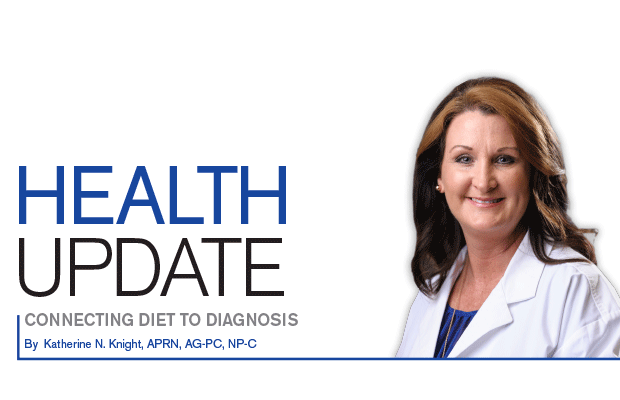
It’s no secret that diet and exercise are good for your overall health and wellbeing. Unfortunately, it often takes a diagnosis or “wake up call” for patients to consider what they eat or how much they move.
In this article, my goal is to provide you with information and resources that may be helpful with a diagnosis such as hypertension, congestive heart failure, renal insufficiency, peripheral vascular disease, coronary artery disease, prior cerebrovascular accident (CVA) and diabetes.
Even though we often wish we could simply take a pill and forget about it, many illnesses are led by and exacerbated by what we eat. Often, a condition can change in just one day, because of too much sugar or salt and not enough water intake or exercise to balance the effect it will have on your system, or to keep your body at a normal balance. This is why it is important for everyone to be diligent in what they consume. Here are a few facts and summaries that may help in doing so.
First, the DASH diet has been known to decrease systolic blood pressure greater than 10 mmHg and reduce the risk of coronary artery disease and CVA by 21%. The basic components of this diet include more servings of fruits and vegetables with nuts, seeds, or beans; low-fat dairy products; lean meats and oily fish; while limiting red meats, cholesterol and sodium intake and sweets.
The Mediterranean Diet is known to lower all cause mortality by 8% and reduce cardiovascular events by 10%. This diet recommends a few less servings of fruits and vegetables per day compared to the DASH diet while increasing soluble fibers by consuming more whole grains such as in pastas, brown rice, oatmeal, and corn.
The goal is that you consume more protein from vegetables than from meat. Limitations to sweets and red meats also apply in this diet, but they offer some preferred options such as dark chocolate, sorbet, low fat yogurt and baked goods with less than 4 grams of fat per serving.
As far as diabetes goes, it’s more of an individual plan that you need. For insulin-dependent diabetics it is important to eat consistently and to adjust your insulin. This is when consuming a set amount of carbohydrates at each meal and adhering to that set plan is most helpful. Other recommendations are omitting sugar beverages, skipping meals and planned snacks, then modifying your diet with portion control and good choices.
Diabetics who are not insulin-dependent should have two goals: regulate blood sugar first, then address weight and finally make the dietary and lifestyle changes needed to reach the goal.
The above addresses consumption of what you eat at meals and briefly states that omitting sugar beverages can be helpful. However, I often notice that many people consume more sodas than water. Water intake is important and can be helpful in regulating blood sugars; increasing kidney function; decreasing appetite, constipation, urinary tract infections and skin irritation; helping with respiratory congestion, and many other things.
Many patients have told me they just don’t like to drink water, while others have said they really didn’t know it was so important. Unless you have congestive heart failure or have a fluid restriction, you should incorporate 6-8 glasses of water into your diet each day.
Talk to your provider about what diet should be encouraged with the illnesses you have; and if you don’t have any current illnesses, it is still a good idea to address this in hopes that you can prevent the onset of disease.
I would like to encourage anyone who isn’t currently under the care of a primary care provider to seek evaluation and start the New Year off with a healthier start.
–









0 comments